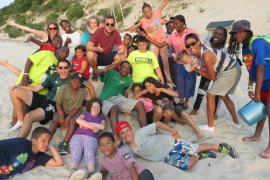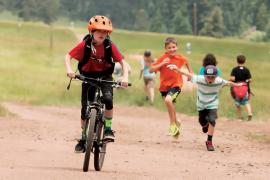What happened throughout one’s generational history influences current views and perspectives, and camp directors carry those perceptions with them in their thoughts and actions — including those that affect their expectations about the recruitment of staff. Thus, it can be helpful to understand where we’ve been and what today looks like to better understand the future needs of staff recruitment.
College/Career Readiness
In the past, many young people went to college with a motivation to get a well-rounded education; at the same time, others went to vocational schools to develop a trade — graduates were expected to be work-ready. In their jobs, young people understood that they would have to work their way up the career ladder into positions of responsibility. Working at camp was often viewed as a "fun" summer job if included on a resume. Employers, however, were pleased to see this work history, as a camp job demonstrated a sense of responsibility, work ethic, and independence. Also in the past, camps (and other seasonal employers) had a large pool of applicants because of baby boomers coming of age.
Today, we see young people going to college to get a job as a primary motivator while vocational education is less valued. Further, both parents and those 18 to 25 years of age believe that a college education should result in a high-paying (often hightech) job — and soon after graduation. Recent graduates expect to be placed in positions of responsibility quickly after entering the workforce. Currently, we see an emphasis on the need for "soft" skills (personal attributes and interpersonal skills) with the recognition that job skills can be taught. We find that those new to the workforce tend to change jobs relatively frequently — particularly in the early years of their employment history.
Working in summer jobs of any sort has decreased over time. Many young people today do not hold a job prior to their college years; consequently, many summer employers are facing a shortage of potential staff. Among other seasonal businesses, a camp job has become undervalued and often is not considered a "real" job. Further, those who apply to work in camps often expect to be hired in a supervisory position — even if they have no camp experience.
What is tomorrow going to bring? It is not unusual to see young people choosing to enroll in community colleges prior to transferring to a four-year school or looking for ways to "hack" college (taking a nontraditional route to a college experience or participating in higher education without a college degree as a goal) because of the huge time and financial commitments required to get a degree. Thus, recruitment resources may be shifted to two-year schools. A growing number of nontraditional students (25 or older, have children, work full-time) on college campuses may also impact the available pool of potential staff.
To take advantage of the relational and critical-thinking skills developed at camp, we envision that camps will formally integrate job preparation activities into their staff development. Conversations about transferring skills learned at camp to careers, resume-writing workshops, bringing in successful staff alumni to talk with current staff about camp as job preparation, and/ or inviting community business people, teachers, or career preparation services to talk with staff about career readiness and development will become popular and offer value that goes beyond the paycheck.
Camps will continue to face hiring challenges as the population size of Gen Z is much smaller than that of previous generations. We will see the last of the baby boomers moving into retirement with Gen Xers not far behind. Camps will continue to struggle with finding college-age summer employees, as they will be competing with higher-paying and simpler (eight-hour shift) jobs. With retirees being healthier and living longer, camps may find it desirable to look to those recently out of the workforce to work in camp settings — particularly as specialty staff (e.g., health care, maintenance) in resident camps or as frontline staff in day camps.
Recruitment/Training
Staff recruitment in the past had the luxury of an "if you have a camp, staff will come" approach to hiring. Staff were available for the entire season, and word of mouth was an effective form of recruiting. Camps were able to rely on "growing their own" by utilizing a progression from camper to counselor/leader-in-training to counselor. It wasn’t uncommon to start hiring returning staff in the fall, utilize the post-holiday season when additional veteran staff made a commitment to return, and then have a recruitment push around Spring Break to round out the staff team. Once accepted, staff showed up to work.
Finding staff who had experience working with youth was common, in part because babysitting at a young age was the norm. Camps were able to hire staff to fill a skilled position (e.g., lifeguard, archery instructor) and could count on staff to come to camp with needed skills and certifications. The interview process was often nothing more than asking a few questions in person or on the phone, and candidates provided written proof of any specialized skills or training upon arrival. Pre-camp staff training often consisted of setting up camp (e.g., putting in docks, painting, putting targets in place) with some focus on youth development, program instruction, and risk management.
"I will sign a contract and may not show up" is unfortunately the modus operandi for many in today’s world. Camps are seeing increased occurrences of "ghosting" as staff inquire about a job, accept an interview, and then neglect to call in or answer at the designated time. Some staff commit to a camp position and then do not show up for work. We know that some potential staff accept multiple job offers and select one at the last minute, often not communicating their decision to remaining employers. In some cases, this is because of young people having a multitude of job options; in other cases it is a need for security — if one job falls through, the applicant wants to be sure they have another at the ready.
Camps compete for staff time during the months of June, July, and August because of travel opportunities, summer school, family vacations, weddings, and other events. There is often a delicate balance to maintain between hiring staff too early, because they may be lost to other opportunities later, and hiring too late and sacrificing quality. Some camps find themselves in the position of having to start the summer with a shortage of staff and resort to hiring someone who may not fully meet their quality standards.
Career/job fairs are not utilized as they once were, but camps are finding ways to be on college campuses by setting up informational tables in high-traffic areas or utilizing connections to organizations and clubs through staff alumni. Various forms of social media and online job posting websites (e.g., Indeed, Handshake, Wayup) are popular avenues to reach potential staff today. Some camps use group interviewing to see how prospective candidates interact and work with others. Skype, Zoom, and other Internet-based platforms have made it easier to virtually meet candidates face-to-face when an in-person interview is not feasible.
Internships, practicums, and independent studies that are required by universities and/or encouraged by parents have been on the rise and serve as competition for the pool of available summer staff. Camps are conducting and paying for more on-site training for technical skills (e.g., ropes course, boating) and may utilize online training as a way for staff to arrive at camp with a base knowledge in key areas (e.g., homesickness, bullying, behavior management).
In terms of "tomorrow," a goal is to have staff say, "I want to work at camp and am committed to the job!" Some camps are offering job sharing, hiring "floaters," allowing time off with advance notice, or shutting down for the holiday weeks (day camps) as ways to address staff availability over the entire summer. Utilizing the camper-to-staff pipeline in intentional ways can provide success in terms of grooming campers through various leadership programs to become superstar staff.
We are seeing camps hire for the person (and not the position) with the understanding that staff who have a desire to grow can be trained with the necessary "hard skills" to do a specific job. Taking advantage of job posting sites such as the ACA Job Center can be a cost-effective way to advertise early and often to find the quality staff desired. Partnering with alumni or community resources can provide a career network that exposes staff to a variety of career options or assists with obtaining internships. Rethinking how an internship looks at camp for majors other than education and recreation, for example, can open up new possibilities for staff prospects. Incorporating an intentional staff development process (as opposed to traditional staff training) will provide a value-added element for staff before, during, and after the camp season.
Communication
In the past, communication was formal — people called neighbors by their titles and last names, handwritten letters were the norm, as was the use of landline telephones — unspoken rules existed for when one should use which form of communication. In terms of camp-to-staff communication, camps used the postal service and mailed staff application and contract materials, which staff received, signed, and promptly returned. Incoming staff responded to phone calls, and it was not uncommon for new staff to call the camp director requesting information. Because of the lack of instant communication there was minimal staff engagement prior to the camp season; some post-season contact continued through printed camp yearbooks and/or newsletters. Camps with advanced technology may have mailed staff a post-season CD of camp photos.
Communication has changed dramatically. Although young people use texting as a constant means of communication, research shows that they prefer face-to-face contact when engaged in substantive interactions. Using one’s phone to make voice calls is less popular than it once was, and video calling is more prevalent. Most camps offer both paper and online application processes, although it can be challenging to get young people to return completed hard-copy paperwork.
In many instances, staff will make a verbal commitment to a camp job only to contact the camp and withdraw or "ghost" the camp by not responding to any type of ongoing communication. Once hired, staff are demanding access to Wi-Fi and continual use of their smartphones. While many enjoy the time at camp as a time away from technology, others find it difficult to go for several hours, let alone several days, without reaching out to family and friends. There is some pre- and post-camp contact among camp staff via social media (e.g., Facebook, Instagram), online group chats (e.g., WhatsApp, GroupMe), and online camp yearbooks, which are available immediately after camp. Staff today want ongoing feedback, they want to feel useful, and they want to be recognized for their work and contributions.
Tomorrow will necessitate a thoughtful review of communication methods and the best way to transmit various forms of messages to different individuals. Virtual communication will continue to grow in popularity, and timing of communication (regardless of method) will continue to be immediate. Camp staff applications will move to being available solely online and easily completed on a cell phone, tablet, or computer. Camp administrators will engage staff year round and begin early in the hiring process; frequent, short communications will be important as staff desire ongoing and personal attention.
Staff will have their own inter-staff communication processes that will be self-initiated and facilitated. Knowing that there will be multiple forms of between-staff communication, camps will find it valuable to identify staff who will be encouraging influencers to ensure positive messaging. Staff will have contact with staff alumni and formal mentors at camp. These individuals will help staff attend to their 21st-century skill development as well as their mental and emotional health needs. Evaluations will be frequent and include information about job performance as well as their personal and interpersonal skill development.
Taking a look at how things were and how things are can help us to understand the needs of tomorrow. We know that staff recruitment will change — exactly how and how quickly remains to be seen.
Considerations for the FutureIf camps are stuck in the methods of yesterday, it will become increasingly difficult to attract and keep quality staff. Considering implementation of the following practices may be imperative to the future success of our camp programs:
|
Debra Jordan, ReD, is a professor in the Department of Recreation and Leisure Studies at East Carolina University and has worked at camps and with the ACA, Southeastern section for many years. Deb can be reached by email at [email protected].
Kim Aycock, MST, has more than 30 years of experience blending the skills of a master teacher with the knowledge of a seasoned camp expert. She trains camp staff at all levels and speaks professionally at regional and national conferences. More information can be found on her website: kimaycock.com. Kim may be contacted at [email protected].
Note: Deb and Kim are the co-leaders of ACA’s Task Force, Project Real Job — its purpose is to examine issues related to summer camp employment and support efforts to recruit, hire, and retain summer staff and position summer camp employment as a valuable career-readiness experience.



